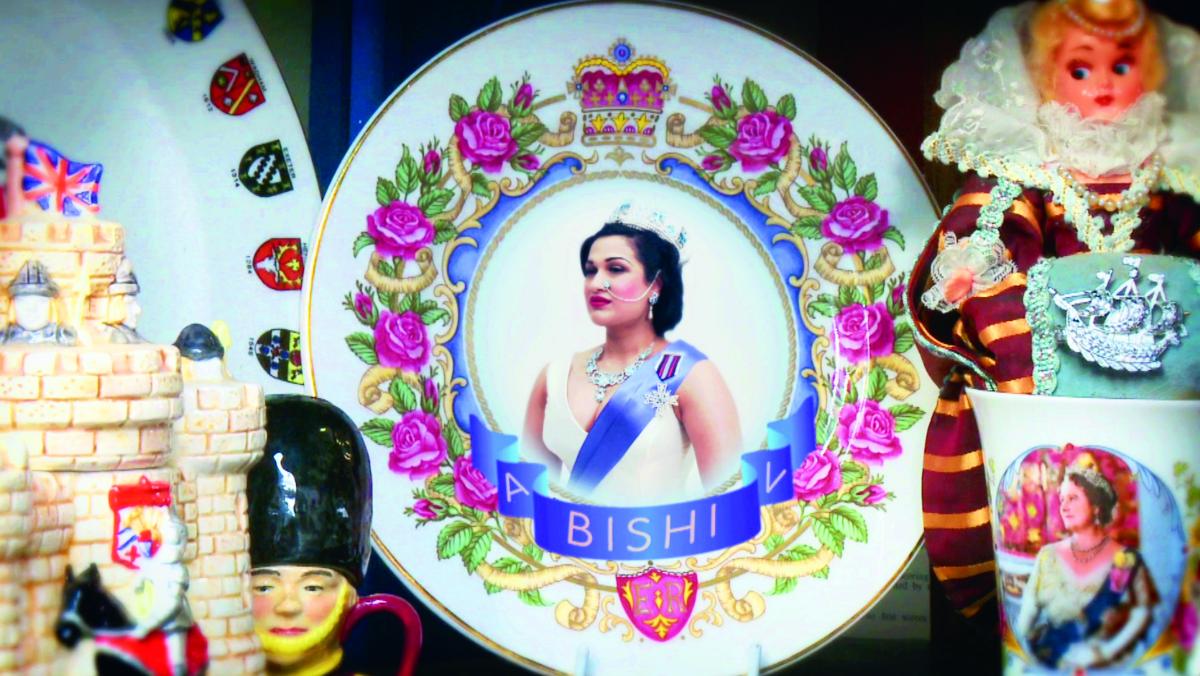
Making Ye Olde England Indian
Bishi's video of «Albion Voice» is reminiscent of the Sex Pistols. She subverts imagery of the national flag while she inserts herself into a pastoral old England to question white Britishness. From the Norient book Seismographic Sounds (see and order here).
Bishi’s song «Albion Voice» claims that someone «Indian in skin» can be «English of heart.» This hybridized identity is reminiscent of singer Morrissey’s «Irish blood, English heart» (2004) and the «mongrel half-bred race» of Daniel Defoe’s poem «The true-born Englishman» (1701). Bishi’s «weaving of clans» is underscored by the music’s texture. The woodwinds, tooth harp and strings of English folk and folk-pop join her sitar. The scale of an Indian raga could be a wistful English melody and vice versa. But the more typical English elements give the song its primary sound. There is little trace of any South Asian vernacular. Bishi enunciates her vocals in a middle-class southern English accent with a gentility that may or may not be entirely serious.
The music video is less ambiguously satirical, reworking nationalist iconography such as the Union Jack flag, the monarchy, and the countryside of mansions and churches. The new technologies of computer animation subvert timeworn images. Bishi’s face morphs into kitschy memorabilia in place of Queen Elizabeth and Britannia. Her several costumes include leather corsets with skirts that stitch Indian and British flags together. Such montage is reminiscent of Jamie Reid’s artwork for punk rock group Sex Pistols, and the performance of «Rule Britannia» by Pistols’ cohort Jordan in Derek Jarman’s queer film Jubilee (1978).
To subvert imagery of the national flag is a well-practiced gesture in the pop culture, but remains necessary as long as that flag carries the symbolic weight of empire. Bishi frolics through fields, perches on a tree branch and strums her sitar like an exotic visitor to Downton Abbey. By inserting herself into a pastoral old England, she suggests an intertwined history of British-Indian exchange and colonialism long before the post-imperial migration and settlement that usually mark the emergence of «multicultural Britain».
The music, bucolic setting and kaleidoscopic graphics imbue «Albion Voice» with the perfume of 1960s British psychedelia, which also articulated an ironic nostalgia for Victorian and Edwardian England, drawing upon folk music and a fascination with Indian culture. «Albion Voice» is a reminder that Indian musicians like Ravi Shankar have influenced this canon. Bishi stakes her place in this folk and rock tradition primarily associated with white Britishness. She revamps that musical heritage with a new yet old-fashioned, self-conscious yet authentic national voice.
This text was published first in the second Norient book Seismographic Sounds.
Biography
Shop

Published on July 04, 2016
Last updated on April 29, 2024
Topics
From Self-Orientalism in Arab music to the sheer exploitation of Brazilian funk music by acclaimed artists: how exotica examine aesthetics playing with the other and cultural misunderstandings.
What happens, when artists move from one to another country? For example, when an Arab artist replaces the big tractors in her the village with big jeeps of the West.
Place remains important. Either for traditional minorities such as the Chinese Lisu or hyper-connected techno producers.
From westernized hip hop in Bhutan to the instrumentalization of «lusofonia» by Portuguese cultural politics.